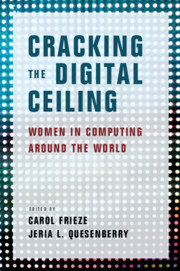Book contents
- Cracking the Digital Ceiling
- Cracking the Digital Ceiling
- Copyright page
- Contents
- Contributors
- Acknowledgments
- Introduction
- Part I Global Perspectives
- Part II Regional Perspectives
- Part III Cultural Perspectives from the United States and Europe
- 7 Against All Odds
- 8 Cultures and Context in Tech
- 9 Perspectives of Women with Disabilities in Computing
- 10 An Interview with Dr. Sue Black, OBE, Computer Scientist and Computing Evangelist
- 11 An Overview of the Swedish Educational System with a Focus on Women in Computer Science
- 12 Portugal
- 13 Women in Computing
- Part IV Cultural Perspectives from Asia-Pacific
- Conclusion
- Notes
- Index
- References
10 - An Interview with Dr. Sue Black, OBE, Computer Scientist and Computing Evangelist
from Part III - Cultural Perspectives from the United States and Europe
Published online by Cambridge University Press: 10 October 2019
- Cracking the Digital Ceiling
- Cracking the Digital Ceiling
- Copyright page
- Contents
- Contributors
- Acknowledgments
- Introduction
- Part I Global Perspectives
- Part II Regional Perspectives
- Part III Cultural Perspectives from the United States and Europe
- 7 Against All Odds
- 8 Cultures and Context in Tech
- 9 Perspectives of Women with Disabilities in Computing
- 10 An Interview with Dr. Sue Black, OBE, Computer Scientist and Computing Evangelist
- 11 An Overview of the Swedish Educational System with a Focus on Women in Computer Science
- 12 Portugal
- 13 Women in Computing
- Part IV Cultural Perspectives from Asia-Pacific
- Conclusion
- Notes
- Index
- References
Summary
Dr. Black is perhaps most well known for initiating – and succeeding – in “saving Bletchley Park” (which is also the title of her book). Bletchley Park was a top-secret center for the famous World War II code breakers, including many women, whose work was credited with shortening the war by two to four years. The center deteriorated rapidly after the war and would most probably have been dismantled if not for the fundraising efforts of Dr. Black and her supporters. Bletchley Park is now a thriving visitors’ center and is co-housed with the UK National Museum of Computing. Dr. Black’s initial involvement with Bletchley Park inspired her to conduct an oral history project to capture the memories of the women who worked there. She met several of the surviving women code breakers; some shared their stories with her, others never revealed the details of their highly secret work.
- Type
- Chapter
- Information
- Cracking the Digital CeilingWomen in Computing around the World, pp. 183 - 202Publisher: Cambridge University PressPrint publication year: 2019

